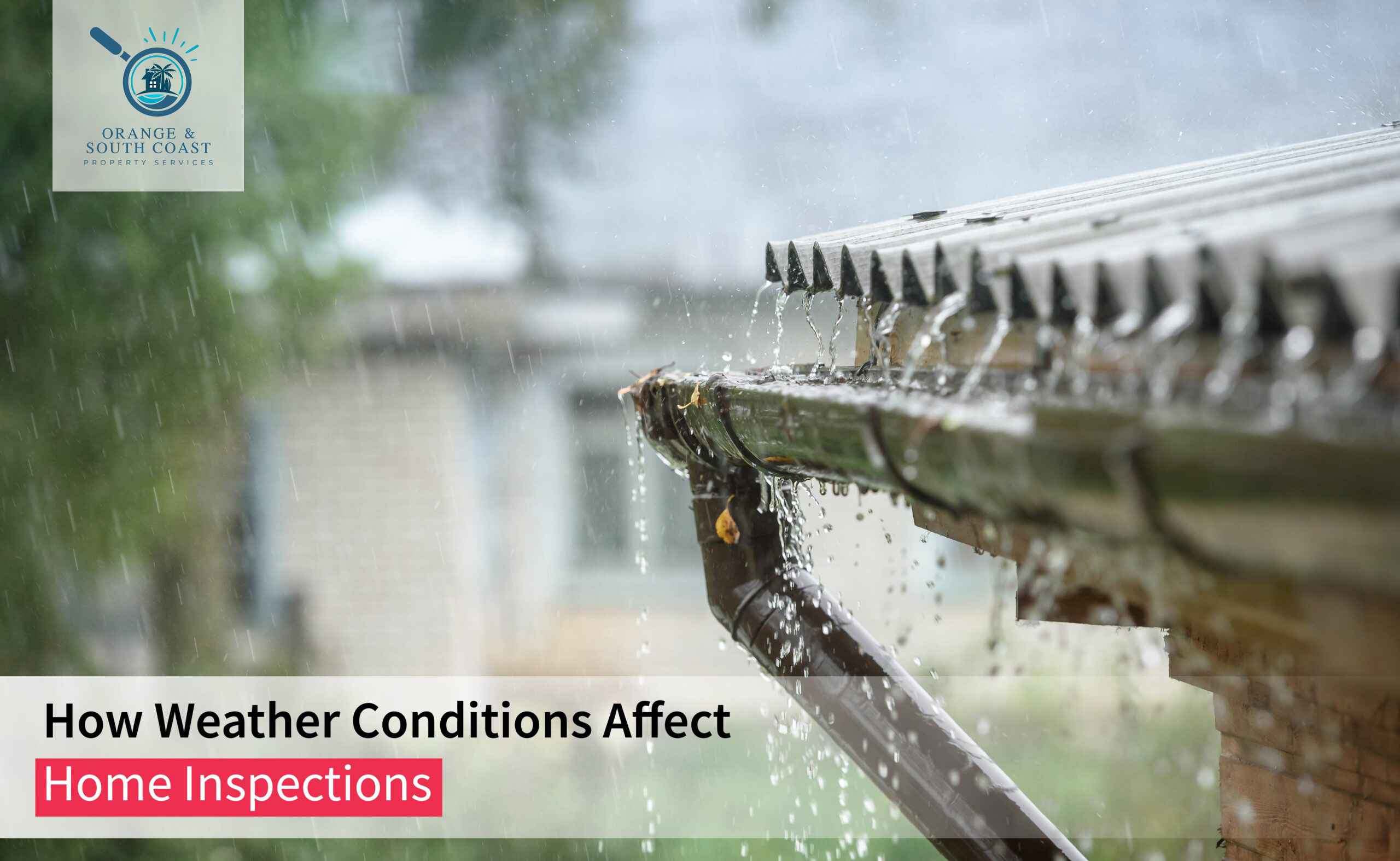Weather conditions can be a good and bad influence during home inspections. These conditions can affect an inspection in a variety of ways. Most of the inspectors usually find major issues within the property because of weather effects. At the same time, extreme weather also makes it challenging for them to inspect every aspect.
One of our qualified inspectors recently mentioned a real estate transaction he worked on where he found substantial water damage. The inspector noted that the issue was more apparent due to the recent heavy rain. The same inspector stated that the severe weather also prevented him from inspecting the roof thoroughly.
Thus, the weather has different effects on home inspections. In this blog, we’ll look at how weather affects inspections. We will also discuss the measures to minimize the negative role of weather in home inspections.
The Impact of Weather on Inspections
Home inspections are an important part of buying and selling of the property.
However, the weather on the day of the inspection might have a big impact on the entire process. Later, they also have an impact on the observations made by inspectors.
Following are the ways weather conditions impact home inspections.
Rain and Its Effects on Roof Inspections
Rainy weather can be challenging during roof inspections (just like our inspector reported). Walking on slippery surfaces is frequently a challenge for inspectors during extreme weather. And it becomes challenging to evaluate roofing materials accurately.
Additionally, leaks or potential water damage may be more apparent. This, therefore, offers valuable insights into the home’s waterproofing.
Snow and Winter Inspections
In colder climates, snow can affect the inspection process in various ways. Snow-covered roofs make it challenging for the inspectors to assess shingle conditions. Furthermore, the frozen ground may limit access to certain areas.
However, winter inspections can uncover issues related to insulation and heating systems that may not be as evident in warmer weather.
Extreme Heat and Its Impact on Materials
Certain materials behave differently at high temperatures. Like in many cases, asphalt shingles become less rigid. This makes it easier for inspectors to detect signs of wear or damage. However, extreme heat can also exacerbate existing issues. These issues may include the expansion of materials like siding or the stressing of HVAC systems.
Wind and Exterior Elements
Windy conditions can impact the exterior elements of a home. Inspectors may pay extra attention to the stability of fences, the condition of siding, and the health of trees surrounding the property.
Furthermore, strong winds can reveal vulnerabilities in the exterior structure. Usually, these issues go unnoticed during calmer weather.
Minimizing the Negative Role of Weather In Home Inspections
Understandably, if you schedule an inspection, you don’t want any property aspect missed during the process. Let alone because of weather conditions.
But you don’t have to worry. There are many strategic approaches you can follow to dodge the negative impacts. Here are some of these approaches you can undertake.
Schedule Inspections Strategically
This is the very basic and the most trusted way.
Undoubtedly, planning inspections during favorable weather conditions is the first line of defense. While accurate weather prediction isn’t always possible. So, scheduling inspections during seasons with milder conditions can minimize the impact of adverse weather on the process.
Monitor Weather Forecasts
Staying two steps will most likely save you. Monitoring weather forecasts is what you can do to save your inspections.
With this, you will gain advanced knowledge of potential rain, snow, or extreme temperatures. This will enable you to plan ahead and, if required, reschedule. Furthermore, you can also take preventive measures during the inspection.
Utilize Protective Gear
If you are an inspector, then this step is for you.
It would be best to come equipped with appropriate protective gear tailored to different weather conditions. This may include rain jackets, boots, or winter gear. Also, ensure they can navigate the property safely and effectively despite adverse weather.
Invest in Shelter and Coverings
If you’re a homeowner, you can spend money on temporary covers or shelters for exterior features like decks and roofs. These may help protect inspectors from extreme weather elements. This precaution also shields the property from potential harm while being inspected.
Inspect Indoors First
You can always begin by inspecting the interior components of a home in extreme weather conditions. This will allow you to gather crucial information before venturing into potentially challenging weather conditions. Moreover, it will make certain that a thorough examination is conducted regardless of external factors.
Focus on Key Areas during Inclement Weather
During adverse weather, inspectors can prioritize specific areas critical to the assessment. For instance, in rainy conditions, the following are the areas inspectors must focus on:
- drainage systems
- gutters
- potential water infiltration points
Adapting the inspection focus will result in an efficient inspection.
Leverage Technology
Using technology during inspections is the best hack to overcome challenges imposed by weather conditions. These technologies may include drones and thermal imaging.
Drones offer aerial views. These can help inspect snow-covered roofs. On the other hand, thermal imaging can reveal hidden issues, regardless of weather conditions.
Coordination Between Homeowners and Inspectors
Inspectors should discuss potential weather challenges with homeowners in advance. This way, homeowners can prepare to cooperate and understand at a new level. Homeowners can also take preparatory measures to facilitate a smoother inspection process.
Flexible Rescheduling Policies
Both inspectors and homeowners should adopt flexible rescheduling policies during extreme weather conditions. Everyone’s safety is guaranteed in this way. Additionally, it allows for a more effective inspection when weather conditions are more conducive.
Document Weather-Related Limitations
Inspectors should transparently document any weather-related limitations that may have affected the inspection. This clarifies to clients the conditions under which the assessment was conducted. Later, it establishes a record of any potential impact on findings.
Overcome the Weather Hurdles with Orange and South Coast Property Services
There are many ways how weather affects your inspections. On one hand, these conditions can reveal hidden issues. And on the other hand, they can make it difficult to access several parts of the property.
Scheduling your inspections strategically and following different approaches can help you in this regard. Like most homebuyers, you can still rely on home inspections with the right strategies.
But, hiring Orange and South Coast Property Services will serve as a cherry on top. Our expert professionals know their work the best. They are known for giving the best outcomes even in challenging conditions. We ensure a comprehensive evaluation that goes beyond the surface. Take the proactive step toward a thorough and weather-resilient inspection. Contact Orange and South Coast Property Services today to safeguard your investment and make informed decisions about your property’s well-being.

